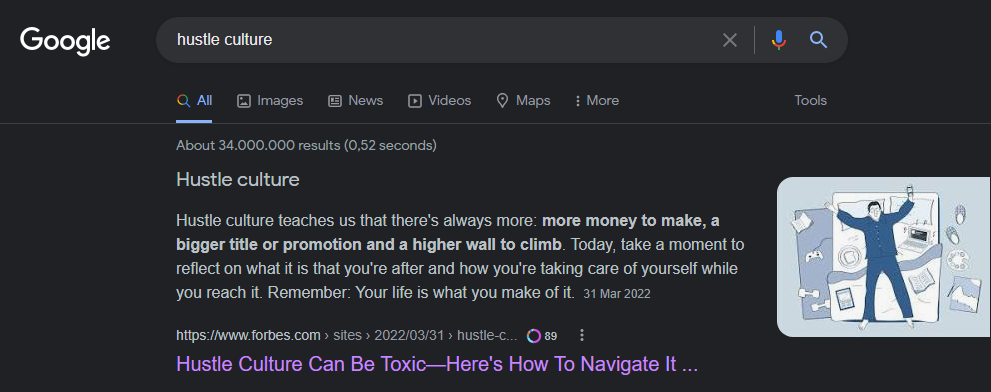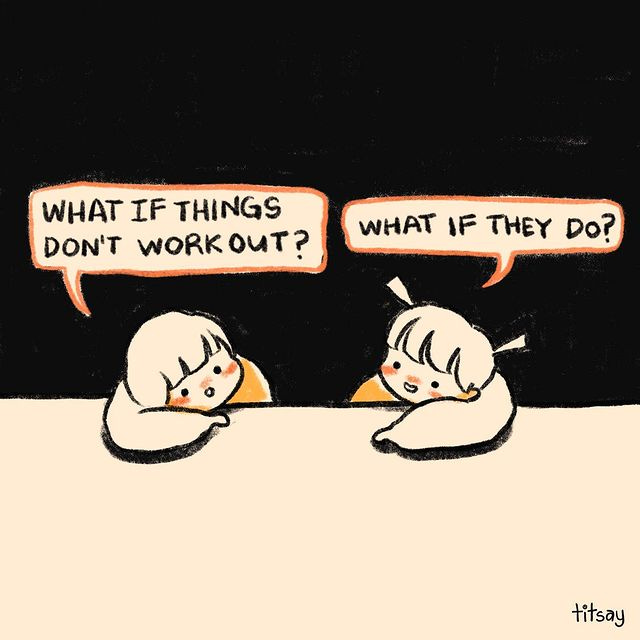Everyday I'm hustlin' — Please don't!
The impact of hustle culture and maybe we could swap that for gap years instead?
Hi there! This week, I'm writing to you from Amsterdam — literally moved in yesterday. I was pulling off a cross-continental shift last week, so you probably (hopefully) missed me in your inbox last week.
I'm all ears for pieces of advice about renting (it's my first time), living in a new space, random life tips, or whatever you'd like to share w me before we get into this issue!
🗣️ Share your nuggets of wisdom (you can stay anon too!)
Most of us follow the school-uni-work-retire-die path of life. Of course, the ‘work’ part can be anything — a salaried job, entrepreneurship, unemployment, etc. But generally, this is how we’re expected to move through life.
This was easier to do in the 1950s when a single person’s salary could fund housing, food, and more for huge families. Now, with the cost of everyday living skyrocketing the way billionaires are into space, almost everyone’s forced to do something more to make ends meet or live more than the bare minimum lifestyle.
However, if you’re able to make enough money to sustain the lifestyle you want but aren’t doing more and more — the general consensus among LinkedIn gurus is that you’re gonna die unsuccessful, lonely, and sad. Or something like that.
That’s hustle culture in a nutshell. No space for rest, leisure, or anything that’s not making you smarter or helping you make $$.
Even Earth’s hustling to do more in less time.
The boomers escaped this completely and are now here to judge. Gen X is also mostly unscathed. However, millennials and Gen Z (and the new few generations) are bearing the brunt of ‘hustling’ — the need for which capitalism has fully manufactured.
When I typed in ‘hustle culture’ to start my research for this issue, this article1 popped up on Forbes. It explores how toxic hustle culture can be and what you can do to navigate it.
But isn’t Forbes part of the whole hustle culture schtick? Don’t people have to accomplish a shit ton to make it to any Forbes XX Under XX list? It’s insane how much you have to do to get on the right radar and get noticed.
Can we let the kids, teens, and young adults relax?
Sometimes, I need to curate stuff off the internet and social media for clients. That’s when I realize how many young teenagers are on there with thousands and tens of thousands of followers, putting out art, making videos, and doing so much beyond their years just to get a headstart in their industry.
In fact, I now look at many of the internships I did between 16 and 20 in a new light. I should’ve been enjoying the entirety of summer, but I was so afraid of not having ‘experience’ that I picked up internships that didn’t really teach me much (or at all).
Today’s teenagers have it worse. They’re gonna enter already saturated markets where it’s becoming more difficult to find a full-time job that has benefits and pays you enough as a fresher. (Unpaid) internships, additional summer courses (online and in person), and innumerable extracurriculars can be found on most resumes.
And in all this, we don’t think about the detrimental effect of hustle culture on our brains, our bodies, and ourselves as a whole. I get wanting to move forward and progress in life, but how did we allow this to become so common at the expense of our mental and physical health?
By forcing workers to be in a ‘go hard or go home’ mindset, hustle culture puts the body in a state of fight or flight. This constant stress releases the stress hormone—cortisol—in higher amounts and for more prolonged periods. To normalize these elevated cortisol levels, the body must enter a state of rest. But what if hustle culture doesn’t allow time for rest? Then burnout is inevitable.
People work a minimum of two jobs, have a hobby they monetize or a little Insta/TikTok shop, put up artwork/writing on the regular for (free) consumption, and so much more — all on top of their full-time jobs.
Most of it is money-related. When you need funds, you have to hustle and work a few more hours and jobs than you’d like. Fair enough.
But if and when you have the choice, do you choose not to hustle? Can you even do that now? My brain fights against the urge to ‘rest’ or even not-do something. I constantly have ideas for new projects, side-hustles, and mini-things to do rotating around.
Maybe we should make gap years more common?
When I think about it, I realize neither I nor anyone in my friend circle has taken a gap year. Instead, we’ve followed the exact path I started the article with. We went from school to college to university, and finally, we’re working. All of this without any real break — minus the 2-4 weeks’ paid holidays from work2.
Hustling 24/7 sounds nice as a lyric but is actually incredibly bad for you in the long term. I’m seeing it happen in real-time with myself and my friends. So many folks around me are burnt out and have quit their jobs in the nick of time because they couldn’t stop hustling beyond their working hours. It’s almost expected of them to continue doing things and having an output of some kind — an expectation from within and from outside.
Maybe instead of quitting or “quiet-quitting” — something new that basically means you don’t do extra work you’re not paid for. Something we all should be doing anyway, perhaps we allow people some years off in their life, like gap years between huge life transitions.
Now it seems like fewer people are actually taking ‘proper’ gap years anyway. Even if you don’t go straight to uni, people use their year off to stay on and work on their hustles — side or otherwise. As a society, we’re making people leap from one job to another, forcing them to do multiple things at a time just to keep up. When do you take some time to figure out what you want to do or the direction you want to go?
However you take one, a gap year takes the pressure off. It’s a lot less hustle. You can pick up an internship or a part-time job, and you don’t have to then come home and work on something else that makes you money or puts you ahead. You can just be, or you can rest. I acknowledge they’re also for those who can afford to take a year off. We need more universities around the work like Florida State University3.
Gap years are immensely beneficial. Other than the personal stuff (you grow as a person and have more experiences that lead to holistic development), if we were all encouraged to take a gap year, we’d get higher grades, be more employable, and generally be better at figuring out the direction we need to go in. Gap years, rest, and taking time off are not indicators of laziness. It’s simply being smart and allowing your body to recharge instead of constantly hustling.
Forget gap years, I’d settle for gap months or even a few weeks between jobs/life events right now, no?
What did you think of this issue?
Your anonymous feedback helps me improve. Thanks!
Extra reading!
Remember when we explored how creative/passion-driven jobs are often paid lesser because people are expected to *want* to do the job anyway? My friend found a literal academic paper proving this is a form of contemporary exploitation. Fun times, yeah.
Another paper that proves that friendships between the rich and poor are the key to reducing poverty. It all goes back to opening closed loops of info and sharing generational knowledge with your peers — unprompted.
Fun things you should check out this week 💌
No one wants to work anymore — brief history in pictures.
A 360 view from the top of Mount Everest — I'm happy to see it from this video only; I don't have the strength or the willpower to climb that beast.
The evolution of an office desk — send me pictures of yours for inspo as I set up mine in my new home!
Need a good cry? Twitter folks shared their favourite sob-fest films bc sometimes, we all need to just *let it out*.
Trying to reframe my thinking like this as I venture out into the unknown in my own life. I hope this provides you some comfort too!
Thanks for reading! Don’t forget to hit like and share this issue if you enjoyed it. 🖤
Overall, a sensible article from a contributor/writer, so I have no complaints about that.
But that’s not actually a break to figure out anything about yourself. You’re just cashing in the “free” time you “earned”.
At Florida State University, all students who apply for a gap-year deferment are automatically considered for financial assistance to fund their activities. Financial aid options are critical in order for gap years to not become the exclusive domain of those who can afford to take them.






Really liked your issue, as always! Also didn't know that about Florida State University. Thanks for sharing! 😃
Thank you for this thoughtful reflection! I can't tell if Hustle Culture is on the rise or on the decline... but articles like yours help me to step back and realize just how saturated we are in it.